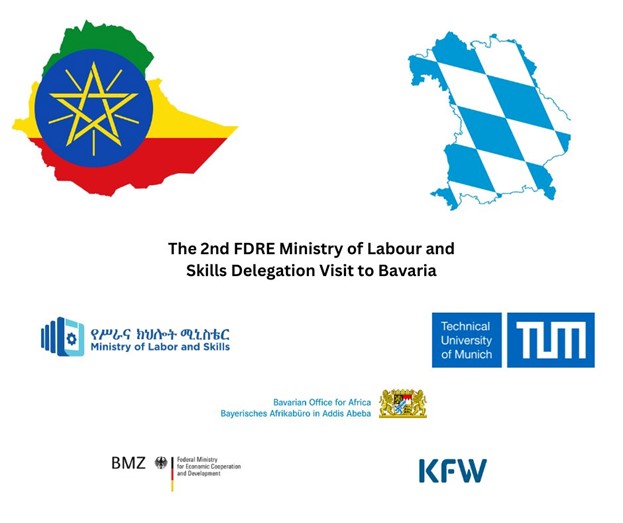Under the leadership of Dr. Mohammed Biruk Kedir, director of the Ethiopian Federal Technical and Vocational Training Institute, a number of high-ranking Ethiopian officials went on the second leg of a study tour to Bavaria. The trip was part of the “Support to the Ethiopian Refugee and Host Community Program” program financed by BMZ and KfW and served to provide capacity building to important decision-makers all over the country.
In several meetings with Bavarian stakeholders, the delegation focused on integrating refugees in the labor market and generating sustainable jobs that help in spreading the benefits of economic growth across all parts of society. This is necessary, as Ethiopia’s workforce currently increases by about 2 million young people each year. At the same time, the country faces the arrival of a high number of refugees and internally displaced persons. Taken together, these factors put a lot of pressure on the absorption capacity of the labor market.
In order to solve this problem, the Ethiopian Ministry of Labor and Skills (MoLS) currently aims to establish a system for technical and vocational training in line with the country’s general development plan. Accordingly, the delegation showed itself especially interested in the German dual training system. This system is firmly established in the German education landscape and is mainly characterized by a cooperation between private firms and publicly funded vocational schools. Trainees typically spend a part of their apprenticeship at the company and another part at the schools. About half of all school-leavers in Germany undergo this kind of vocational training. Thanks to this, the country enjoys low youth employment and high skill levels. Companies typically argue that taking on trainees within the framework of the dual system is the best way to recruit skilled staff.
To take home some inspiration about this system and find ways to implement some version of it within the Ethiopian context, the delegation met representatives of the German Federal Institute for Vocational Training (BIBB) as well as the chamber of industry and commerce (IHK) and the Bavarian Ministry of Economic Affairs. In a further meeting with Mr. Michael Köller, Head of the Department for European and International Politics at the Bavarian State Chancellery, the participants of the study tour discussed the establishment and continuation of future-oriented partnerships between Bavaria and the MoLS in the area of technical and vocational training (TVET).
But that was not everything: The delegation also paid a visit to multiple public TVET colleges and the production company Bauer which provides dual vocational training. Through these meetings, the visitors also got a feeling for and input from the more practical side of things.
All in all, the study tour provided Ethiopian decision-makers with a lot of new information about the German TVET system and the integration of refugees in the labor market as well as ways to implement a similar approach in a different national context. As such, it can be seen as an investment in Ethiopia’s future that helps to ensure that the country’s young population can contribute to economic development, peace, and stability.

